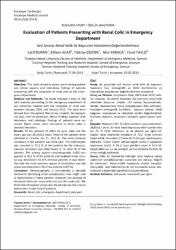Evaluation of patients presenting with renal colic in emergency department
Abstract
Objective: This study aimed to assess some demographical
and clinical aspects and laboratory findings of patients
presenting with the complaint of renal colic to the emergency
department.
Material and Methods: The study included a total of 150
adult patients presenting to the emergency department of
our University hospital with the complaint of renal colic
between January 2009 and January 2010. The data were
derived from the patient files of our hospital. Demographical
data, time of admission, clinical findings together with
laboratory and radiologic findings of patients were assessed.
Mean values were calculated as mean value ±
standard deviation.
Results: Of the patients 91 (68,4 %) were male and the
mean age was 38,9±16,5 years. Most of the patients were
admitted in October (n= 22, 16,6 %). The most common
complaint of the patients was flank pain. The erythrocytes
was revealed in 72,2 % of the patients by the urinalysis.
Calculus formation was determined in 71 (53,4 %) of the
patients. The urinary system ultrasonography (USG) was
applied to 39,1 % of the patients and localized renal calculus
was detected in 52,0 % of those patients. It was identified
that the most common region of localization was the
ureter and detected in 29 of the patients (40,9 %).
Conclusion: Ultrasonography is considerably a valuable
method in identifying renal complications that might lead
to dysfunctions in these patients. However, the absence of
hematuria does not necessarily rule out the renal colic. We
think that emergency physicians should rule out the urinary
obstruction in such kind of patients. Amaç: Bu çalışmada acil servise renal kolik ile başvuran
hastaların bazı demografik ve klinik özelliklerinin ve
laboratuvar bulgularının değerlendirilmesi amaçlandı.
Gereç ve Yöntem: Çalışmamız Ocak 2009-Ocak 2010 tarihleri
arasında Üniversite hastanesi acil servisine renal kolik
nedeniyle başvuran, erişkin, 150 hastayı kapsamaktadır.
Veriler, hastanemizin hasta dosyalarından elde edilmiştir.
Hastaların demografik özellikleri, başvuru zamanı, klinik
bulguları, laboratuvar ve radyolojik verileri değerlendirildi.
Ortalama değerler, ortalama ± standart sapma olarak verildi.
Bulgular: Hastaların 91’i (% 68,4) erkekti ve yaş ortalamaları
38,9±16,5 yıl idi. En fazla hasta başvurusu ekim ayında oldu
(n= 22, % 16,6). Hastaların en sık şikayeti yan ağrısı idi.
Yapılan idrar analizinde hastaların % 72,2’ sinde eritrosit
tespit edildi. Hastaların 71’inde (% 53,4) taşın lokalizasyonu
belirlendi. Üriner sistem ultrasonografi (USG)’si uygulanan
hastalarda (n=52, % 39,1) taşın görülme oranı % 52,0 idi.
Tespit edilen en sık taş yerleşim yerinin 29 hasta (% 40,9) ile
üreter olduğu belirlendi.
Sonuç: USG, bu hastalarda böbreğin işlev kaybına sebep
olabilecek komplikasyonları saptamak için oldukça değerli
bir yöntemdir. Renal kolikli hastalarda mutlak hematüri
olmayabilir. Acil hekimlerinin bu tür hastalarda üriner obstrüksiyonu
dışlamaları gerektiğini düşünmekteyiz.
Source
Afyon Kocatepe Üniversitesi, Kocatepe Tıp DergisiVolume
15Issue
3Collections
- Kocatepe Tıp Dergisi [154]



















